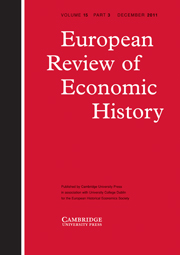Crossref Citations
This article has been cited by the following publications. This list is generated based on data provided by
Crossref.
David, Thomas
2008.
Nationalisme économique et industrialisation.
p.
411.
Sánchez, José Jurado
2009.
Military Expenditure, Spending Capacity and Budget Constraint in Eighteenth-Century Spain and Britain.
Revista de Historia Económica / Journal of Iberian and Latin American Economic History,
Vol. 27,
Issue. 1,
p.
141.
PRATT, DAVID
SCHOFIELD, P. R.
FRENCH, HENRY
KIRBY, PETER
FREEMAN, MARK
GREAVES, JULIAN
and
PEMBERTON, HUGH
2009.
Review of periodical literature published in 2007.
The Economic History Review,
Vol. 62,
Issue. 1,
p.
153.
HANTKE, MAX
and
SPOERER, MARK
2010.
The imposed gift of Versailles: the fiscal effects of restricting the size of Germany's armed forces, 1924–9.
The Economic History Review,
Vol. 63,
Issue. 4,
p.
849.
Eloranta, Jari
2011.
Why did the League of Nations fail?.
Cliometrica,
Vol. 5,
Issue. 1,
p.
27.
Yanovskiy, Konstantin Moshe
Shestakov, Daniel E.
and
Zhavoronkov, Sergei
2013.
Democracy of 'Taxation-Redistribution' and Peacetime Budget Deficit.
SSRN Electronic Journal,
Yanovskiy, Konstantin Moshe
Zatcovecky, Ilya
and
Syunyaev, Georgiy
2013.
How Safe Is It, to Confuse Defense with Care?.
SSRN Electronic Journal,
Sabatt Domingo, Oriol
2014.
Do Democracies Spend Less on the Military? Spain as a Long-Term Case Study (1876-2009).
SSRN Electronic Journal,
Eloranta, Jari
2014.
Handbook of Cliometrics.
p.
1.
Eloranta, Jari
Andreev, Svetlozar
and
Osinsky, Pavel
2014.
Research in Economic History.
Vol. 30,
Issue. ,
p.
1.
Yanovskiy, Konstantin Moshe
Shestakov, Daniel E.
and
Zhavoronkov, Sergei
2014.
: (Democracy of 'Taxation-Redistribution' and Peacetime Budget Deficit).
SSRN Electronic Journal,
Hoffman, Philip T.
2015.
What Do States Do? Politics and Economic History.
The Journal of Economic History,
Vol. 75,
Issue. 2,
p.
303.
Yanovskiy, Konstantin Moshe
and
Zatcovetsky, Ilia
2015.
''''''" - ' (How Compatible Are Huge Spending for 'Butter' and Quality Defense?).
SSRN Electronic Journal,
Walter, Andrew
2016.
Open economy politics and international security dynamics: Explaining international cooperation in financial crises.
European Journal of International Relations,
Vol. 22,
Issue. 2,
p.
289.
Rota, Mauro
2016.
Military spending, fiscal capacity and the democracy puzzle.
Explorations in Economic History,
Vol. 60,
Issue. ,
p.
41.
Sabaté, Oriol
2016.
DO DEMOCRACIES SPEND LESS ON THE MILITARY? SPAIN AS A LONG-TERM CASE STUDY (1876-2009).
Revista de Historia Económica / Journal of Iberian and Latin American Economic History,
Vol. 34,
Issue. 3,
p.
385.
Sabaté, Oriol
2016.
Does military pressure boost fiscal capacity? Evidence from late-modern military revolutions in Europe and North America.
European Review of Economic History,
Vol. 20,
Issue. 3,
p.
275.
Eloranta, Jari
2016.
Handbook of Cliometrics.
p.
563.
SMITH, ANDREW D.
and
MUSSIO, LAURENCE B.
2016.
Canadian Entrepreneurs and the Preservation of the Capitalist Peace in the North Atlantic Triangle in the Civil War Era, 1861–1871.
Enterprise & Society,
Vol. 17,
Issue. 3,
p.
515.
Yanovskiy, Konstantin
Zhavoronkov, Sergei
Shestakov, Daniel
and
Socol, Yehoshua
2016.
Universal Suffrage: Undeclared Conflict of Interest.
SSRN Electronic Journal ,


